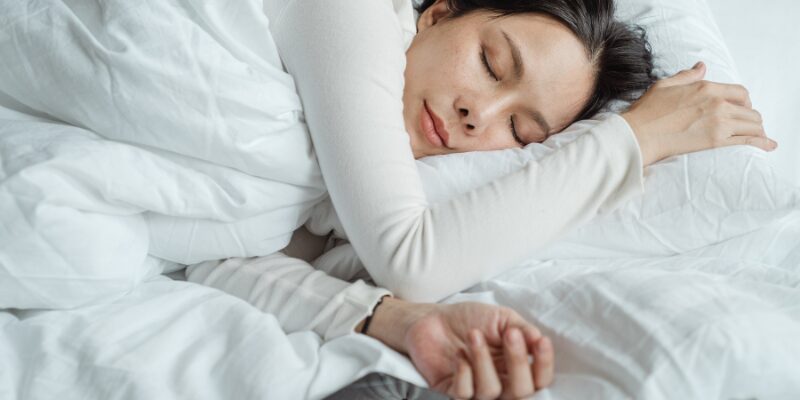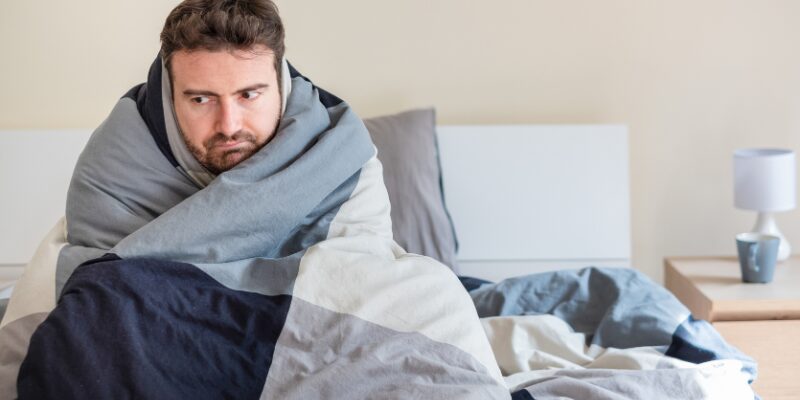
Why Is Sleep Important for Mental Health?
- January 13, 2024
- Lifestyle and Wellness
- 0 Comments
Everyone has experienced that feeling! It’s one o’clock in the morning, and you close your eyes, struggling on your bed. Then you helplessly open your eyes, looking for something to help you sleep better; you try turning on meditation music, picking up a book to read, etc.
What happens? The alarm bell rings, and you really feel like you’re going to hell because you haven’t slept at all, and you still have to get out of bed and start the new day in a tired, lifeless state. What’s worse, insomnia can persist day after day, and you don’t know the real cause of your insomnia.
Don’t rush! Mental Map Guide will show you why you can’t sleep well, why sleep is important for mental health and awesome tips you can follow to get better sleep with sweet dreams every night.
Table of Contents
What Happens When You Sleep?

Well, it’s a time process for your brain and body. First, sleep helps your brain organise and absorb information from the day, improving your memory and learning and regulating your mood and emotions.
It means that if you have a lack of good sleep, it can be the cause of some symptoms, such as depression, anxiety, and irritability.
Besides, during sleep, your brain acts like a “swob’, it removes harmful waste products, contributing to optimal functioning when you’re awake. If you are severely sleep deprived, your brain will tend to have memory loss and neurological disorders.
But it’s not just your brain that benefits from sleep. Your body goes into repair and rebuild mode while you snooze. This is when it clears out debris from your lymphatic system, boosting your immune system.
Here are some key processes during sleep:
- Muscle repair
- Protein synthesis
- Tissue growth
- Hormone release
So, catching those Zs is like a comprehensive maintenance session for your mind and body.
During a whole night’s sleep, you experience several sleep cycles, each with four stages. The first three stages are non-REM (rapid eye movement), and the fourth and final stage is REM sleep.
The four stages of sleep include:
- Stage 1: Falling asleep (lasts 1 to 5 minutes)
- Stage 2: Subdued sleep (lasts 10 to 60 minutes)
- Stage 3: Deep sleep (lasts 20 – 40 minutes)
- Stage 4: REM sleep & dreaming ( lasts 10 to 60 minutes)
Reasons Why You Can’t Sleep At Night

There are many reasons that lead us to bad sleep at night, Mental Map Guide consume some common reasons that you might have at least one.
Stress and Worry
You have a lot of things to do every day and still need to finish them. When you constantly think about it, your mind is still active, so even if you try to close your eyes, it will still be difficult to relax and fall asleep.
Uncomfortable Sleep Setup
A bed that is too small or too big can make you uncomfortable, and too bright lights and noise outside the room can also be the cause. In addition, if the room temperature is too cold or too hot, it will also make it difficult to sleep.
Screens Before Bed
We often have the habit of scrolling through our phones before sleeping. You tell yourself to only surf ten times, but the internet has so many exciting and entertaining things that can keep you occupied for hours.
Messy Sleep Schedule
Your sleep schedule needs to be more manageable. For example, if you sleep until 10:00 in the morning, you will likely have difficulty sleeping early in the evening, especially when your job requires little activity.
Caffeine and Stimulants
Even if you’re a coffee enthusiast, you should avoid using it right before bedtime or late in the afternoon. Caffeine, a stimulant found in coffee, has a significant half-life, meaning it takes considerable time to break down and eliminate from your body. On average, coffee often has a half-life of approximately five to six hours, sometimes even more. This means that coffee can make you stay active for long hours. If you’re looking for a better night’s sleep, savour your cup of coffee in the morning and skip it for the rest of the day.
Medication Side Effects
Insomnia can be triggered by certain medications. Examples include alpha-blockers, beta-blockers, corticosteroids, and statins. If you’ve observed changes in your sleep patterns since starting a new medication, the drugs might be the culprit.
Alcohol Before Bed
Although alcohol might initially make you feel sleepy due to its relaxing effects, excessive consumption can disrupt your sleep cycle. Alcohol interferes with the circadian rhythm, the body’s “master clock” responsible for regulating sleep, immunity, energy, metabolism, and mood levels.
For better sleep quality, it’s advisable to avoid consuming too much alcohol right before bedtime. Alternatively, if you enjoy a drink, consider having it earlier in the day. Similar to coffee, alcohol has a long half-life, meaning it stays in your body for an extended period.
Over Eating
If your dinner is too heavy, it could be impacting your sleep. A heavy dinner typically consists of much food, especially rich or high-calorie dishes. This can include fatty foods, large servings, or meals that are difficult to digest.
Read more: 8 Key Nutrients In Improving Your Sleep.
Why Sleep Is Important for Your Mental Health

Sleep protects your mental health in a good state and allows you to be relaxed and active in both thoughts and actions. There is no exact data on the impact of sleep on mental health, but a few medical studies have proven that lack of sleep is one of the factors causing mental health problems and other diseases.
Here are some evidence demonstrating the connection between sleep and specific mental and physical health conditions:
Cancer:
Although there’s no direct evidence linking sleep quantity or quality affects the risk of cancer is inconclusive, studies have explored the potential connection between inadequate sleep and the risk of certain cancers, such as lung cancer. More studies are needed to understand the relationship fully.
Respiratory Illness and Infection:
Lack of sleep can be the reason why you are susceptible to respiratory diseases or infections. According to the study, more than 600,000 people said that they were more likely to catch colds or flu or make infections worse after losing sleep.
Depression:
Up to 300 million people in the world are suffering from depression, and it is often accompanied by difficulty sleeping. This is a disease characterised by high mood and often characterised by feelings of sadness and hopelessness. About 75% of depressed people have symptoms of insomnia or excessive daytime sleepiness.
Heart Disease:
About 40% to 60% of people with heart failure are diagnosed with sleep-disordered breathing. This is a common sleep disorder caused by obstructed breathing, associated with several cardiovascular (heart and blood vessel) diseases.
Anxiety:
Mental health professionals call excessive worrying generalized anxiety disorder (GAD). The level of anxiety will affect sleep disorders. The more anxiety and stress, the more difficult it is to sleep. According to one study, GAD is predicted in children and adolescents from the ages of 9 to 16 who often have sleep problems.
Bipolar Disorder:
A telltale sign of bipolar disorder is rapid emotional changes, switching from depression to euphoria and vice versa. Like losing control of mood, thus creating changes in sleeping habits. This means that how much or how little sleep they get will depend on their emotional state. When they are in a state of excitement, they will tend to sleep less. When they are depressed, they tend to sleep more.
Schizophrenia:
Schizophrenia is one of the characteristic mental disorders. Symptoms of this disease can include lack of sleep or can become more dangerous due to the use of drugs used to treat this disease.
How to Have A Good Sleep
Getting a good night’s sleep is not difficult, but it takes time to make changes. Mental Map Guide suggests simple but extremely effective steps for you. If you have insomnia, you can apply it right after reading this article.
Daytime and Ongoing:
- Keep your room comfortably cool.
- Stick to a new consistent sleep and wake time.
- Dim the lights in the evening to ease your eyes.
- Avoid stimulants like caffeine after 3:00 pm.
- Skip late-day meals that can disturb your sleep, such as fatty, spicy, or citrusy foods.
- Exercise into your routine, even a short daily walk or activities like household chores, bodyweight exercises, biking, dancing, yoga, or Pilates.
- Limit daytime naps to 10-20 minutes.
- Reserve your bed for sleep, sexual activity, reading, or other routine-focused activities.
Final Thought
An adult needs a minimum of about 7 hours of sleep a day; good sleep quality gives you excellent mental and physical health. You will have the energy to work more effectively in daily activities. In addition, regular good sleep can help you prevent the risk of diseases such as diabetes, heart disease and other diseases.
If you feel your lack of sleep is just developing in the early stages, don’t ignore it. Make a plan to improve your sleep as soon as possible. If you are severely sleep-deprived, you should make an appointment with a specialist to get the most suitable solution.






